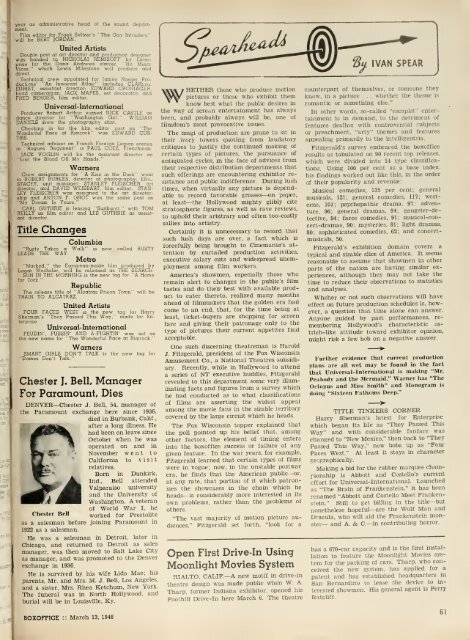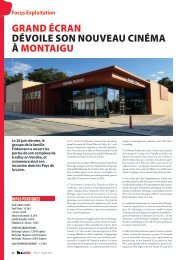Create successful ePaper yourself
Turn your PDF publications into a flip-book with our unique Google optimized e-Paper software.
f- l^."*<br />
: March<br />
head ol the sound depart-<br />
United Artists<br />
ot Double post art director and production designer<br />
was handed to NICHOLAI REMISOFF by Enterprise<br />
lor the Dana Andrews starrer. "No Minor<br />
Vices," which Lewis Milestone will produce and<br />
direct.<br />
Technical crew appointed lor James Nasser Productions'<br />
"An Innocent Allair" includes CLARtlNL<br />
EURIST, assistant director; EDWARD CRONJAGER<br />
head cameraman, JACK MAPES, set decorator: and<br />
FRED BERGER. Iilm editor.<br />
Universal-International<br />
Producer Robert Arthur signed NICK CASTLE as<br />
dance director lor "Washington GirL" WILLIAM<br />
DANIELS drew the photography stint<br />
Checking in lor the lilm editor post on "The<br />
Wonderlul Race at Rimrock" was EDWARD CUR-<br />
Wamers<br />
. Crew assignments tor "A Kiss in the Dark" went<br />
to ROBERT BURKES, director of pholographv; ERit^<br />
STACEY, unit manager, STANLEY FLEISCHER, art<br />
director, and DAVID WEISBART, lilm editor. STAN-<br />
LEY FLEISCHER was assigned to the art directorship<br />
and ANTON F. GROT won the same post on<br />
Your;<br />
CARL GUTHRIE<br />
^EILLY<br />
edit<br />
Title Changes<br />
Columbia<br />
"Rusty Takes a Walk" is now called RUSTY<br />
LEADS THE WAY.<br />
Metro<br />
e Eurt<br />
Lagctt Wechsler, will<br />
SUN IN THE MORNING is the new tag lor '<br />
ior Jock."<br />
Republic<br />
The release title of "Alcatraz Prison Train"<br />
TRAIN TO ALCATRAZ.<br />
United Artists<br />
FOUR FACES WEST is the new tog tc<br />
"<br />
Sherman's "They Passed This Way, made<br />
Universal-International<br />
FEUDIN', FUSSIN' AND A-FIGHTIN' was<br />
the new name lor 'The Wonderlul Race at R<br />
Warners<br />
SMART GIRLS DON'T TALK is the new<br />
"Dames Don't Talk."<br />
Chester J. Bell, Manager<br />
For Paramount, Dies<br />
DEN'VER— Chester J. Bell. 54. manager of<br />
the Paramount, exchange here since 1936.<br />
died in Burbank, Calif.,<br />
^^^^^' ^ ^°"^ illness. He<br />
R- ^ .^^^^^L. .^MK^.<br />
had been on leave since<br />
October when he was<br />
operated on and in<br />
November went to<br />
Califoniia to visit<br />
. .<br />
^^^^<br />
relatives.<br />
Bom in Dunkirk,<br />
Ind., Bell attended<br />
Valparaiso university<br />
and the University of<br />
',f<br />
^HH Washington. A veteran<br />
of World War I, he<br />
Chester Bell worked for Prestolite<br />
as a salesman before joining Paramount in<br />
1922 as a salesman.<br />
He was a salesman in Detroit, later in<br />
Chicago, and returned to Detroit as sales<br />
manager, was then moved to Salt Lake City<br />
as manager, and was promoted to the Denver<br />
exchange in 1936.<br />
He is survived by his wife Lida Mae; his<br />
parents. Mr. and Mrs. M. J. Bell, Los Angeles,<br />
and a sister, Mrs. Rhea Ketchiun, New York.<br />
The funeral was in North Hollywood, and<br />
be in Louisville. Ky.<br />
burial will<br />
HETHER those who produce motion<br />
pictures or those who exhibit them<br />
know best what the public desires in<br />
the way of screen entertainment has always<br />
been, and probably always will be, one of<br />
filmdom's most provocative issues.<br />
The magi of production are prone to sit in<br />
their ivory towers quoting from laudatory<br />
critiques to justify the continued making of<br />
certain types of pictures, the pursuance of<br />
antiquated cycles, in the face of advices from<br />
their respective distribution departments that<br />
such offerings are encounteri:ig exhibitor resistance<br />
and public indifference. During lush<br />
times, when virtually any picture is dependable<br />
to record favorable grosses—on paper,<br />
at least—the Hollywood mighty glibly cite<br />
stratospheric figures,<br />
as well as rave reviews,<br />
to uphold their arbitrary and often too-costly<br />
sallies into artistry.<br />
Certainly it is unnecessary to record that<br />
such lush days are over, a fact which is<br />
forcefully being brought to Cinemania's attention<br />
by curtailed production activities,<br />
executive salary cuts and widespread unemployment<br />
among film workers.<br />
America's showmen, especially those who<br />
remain alert to changes in the public's film<br />
tastes and do their best with available product<br />
to cater thereto, realized many months<br />
ahead of filmmakers that the golden era had<br />
come to an end, that, for the time being at<br />
least, ticket-buyers are shopping for screen<br />
fare and giving their patronage only to the<br />
type of pictures their current appetites find<br />
acceptable.<br />
One such discerning theatreman is Harold<br />
J. Fitzgerald, president of the Pox "Wisconsin<br />
Amusement Co., a National Tlieatres subsidiary.<br />
Recently, while in Hollywood to attend<br />
a series of NT executive huddles, Fitzgerald<br />
revealed to this department some very illuminating<br />
facts and figures from a survey which<br />
he had conducted as to what classifications<br />
of films are asserting the widest appeal<br />
among the movie fans in the sizable territory<br />
covered by the large circuit which he heads.<br />
The Fox "Wisconsin topper explained that<br />
the poll pointed up his belief that, among<br />
other factors, the element of timing enters<br />
into the boxoffice success or failure of any<br />
given feature. In the war years, for example,<br />
Fitzgerald learned that certain types of films<br />
were in vogue: now, in the unstable postwar<br />
era, he finds that the American public—or,<br />
at any rate, that portion of it which patronizes<br />
the showcases in the chain which he<br />
heads— is considerably more interested in its<br />
own problems, rather than the problems of<br />
others.<br />
"The vast majority of motion picture audiences,"<br />
Fitzgerald set forth, "look for a<br />
Open First Drive-In Using<br />
Moonlight Movies System<br />
RIALTO. CALIF.—A new motif in drive-in<br />
theatre design was made public when W. A.<br />
Tharp. former Indiana exhibitor, opened his<br />
Foothill Drive-In here March 6. The theatre<br />
counterpart of themselves, or .someone they<br />
know, in a picture . . . whether the theme is<br />
romantic or .something else."<br />
In other words, so-called "escapist" entertainment<br />
is in demand, to the detriment of<br />
features dealing with controversial subjects<br />
or preachment, "arty" themes and features<br />
appealing primarily to the intelligentsia.<br />
Fitzgerald's<br />
survey embraced the boxoffice<br />
results as tabulated on 90 recent top releases,<br />
which were divided into 14 type classifications.<br />
U.sing 100 per cent as a base index,<br />
his findings worked out like<br />
of<br />
their popularity and revenue:<br />
this, in the order<br />
Musical comedies, 135 per cent; general<br />
musicals, 121; general comedies, 117; westerns,<br />
101; psychopathic drama. 97; adventure,<br />
96; general dramas, 94; gang.ster-detective,<br />
94; farce comedies, 91; musical-concert-dramas,<br />
90; 81; mysteries, light dramas,<br />
80; sophisticated comedies, 62; and concertmusicals,<br />
50.<br />
Fitzgerald's exhibition domain covers a<br />
typical and sizable slice of America. It seems<br />
reasonable to assume that showmen in other<br />
parts of the nation are having similar experiences,<br />
although they may not take the<br />
time to reduce their observations to statistics<br />
and analyses.<br />
Wheher or not such observations will have<br />
effect on future production schedules is, however,<br />
a question that time alone can answer.<br />
Anyone guided by past performances, remembering<br />
Hollywood's characteristic ostrich-like<br />
attitude toward exhibitor opinion,<br />
might risk a few bob on a negative answer.<br />
Further evidence that current production<br />
plans are all wet may be found in the fact<br />
that Universal-International is making "Mr.<br />
Peabody and the Mermaid," Warner has "The<br />
Octopus and Miss Smith" and Monogram is<br />
doing "Sixteen Fathoms Deep."<br />
TITLE TINKERS CORNER<br />
Harry Sherman's latest for Enterprise,<br />
which began its life as "They Passed This<br />
Way" and with considerable fanfare was<br />
changed to "New Mexico," then back to "They<br />
Passed This Way," now bobs up as "Four<br />
Faces West." At least it stays in character<br />
geographically.<br />
Making a bid for the rubber marquee championship<br />
is Abbott and Costello's current<br />
effort for Universal-International. Laimched<br />
as "The Brain of Frankenstein." it has been<br />
renamed "Abbott and Costello Meet Frankenstein."<br />
Still to get billing in the title—but<br />
nonetheless hopeful—are the Wolf Man and<br />
Dracula, who will aid the Frankenstein monster—<br />
and A. & C—in contributing horror.<br />
has a 670-car capacity and is the fii-st installation<br />
to feature the Moonlight Movies system<br />
for the parking of cars. Tharp, who conceived<br />
the new system, has applied for a<br />
patent and has established headquarters in<br />
San Bernardino to lease the device to interested<br />
showmen. His general agent is Perry<br />
Rfttcliff.<br />
I,*<br />
BOXOFFICE<br />
:<br />
13, 1948<br />
61

















